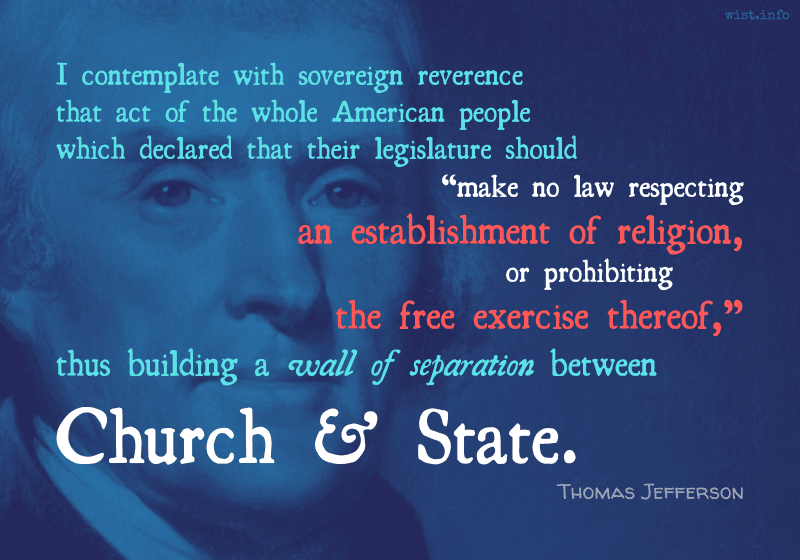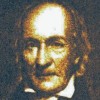Believing with you that religion is a matter which lies solely between Man & his God, that he owes account to none other for his faith or his worship, that the legitimate powers of government reach actions only, & not opinions, I contemplate with sovereign reverence that act of the whole American people which declared that their legislature should “make no law respecting an establishment of religion, or prohibiting the free exercise thereof,” thus building a wall of separation between Church & State. adhering to this expression of the supreme will of the nation in behalf of the rights of conscience, I shall see with sincere satisfaction the progress of those sentiments which tend to restore to man all his natural rights, convinced he has no natural right in opposition to his social duties.
Thomas Jefferson (1743-1826) American political philosopher, polymath, statesman, US President (1801-09)
Letter to the Danbury Baptists (1 Jan 1802)
(Source)
Addressed to "messrs. Nehemiah Dodge, Ephraim Robbins, & Stephen S. Nelson, a committee of the Danbury Baptist association in the state of Connecticut."
Quotations about:
religious freedom
Note not all quotations have been tagged, so Search may find additional quotes on this topic.
I consider the Government of the United States as interdicted by the Constitution of the United States from meddling with religious institutions, their doctrines, discipline, or exercises [….] But it is only proposed that I should recommend, not prescribe, a day of fasting and praying. That is, I should indirectly assume to the United States an authority over religious exercises, which the Constitution has directly precluded them from. It must be meant, too, that this recommendation is to carry some authority and to be sanctioned by some penalty on those who disregard it; not indeed of fine and imprisonment, but of some degree of proscription perhaps in public opinion. And does the change in the nature of the penalty make the recommendation less a law of conduct for those to whom it is directed? […] Every one must act according to the dictates of his own reason and mine tells me that civil powers alone have been given the President of the United States, and no authority to direct the religious exercise of his constituents.
Thomas Jefferson (1743-1826) American political philosopher, polymath, statesman, US President (1801-09)
Letter to Samuel Miller (23 Jan 1808)
(Source)
On refusing to issue a Thanksgiving proclamation during his presidency.
The notion of a Christian commonwealth should be exploded forever. … Government should protect every man in thinking and speaking freely, and see that one does not abuse another. The liberty I contend for is more than toleration. The very idea of toleration is despicable; it supposes that some have a pre-eminence above the rest to grant indulgence, whereas all should be equally free, Jews, Turks, Pagans and Christians.
I don’t say I’ve got much of a soul, but, such as it is, I’m perfectly satisfied with the little chap. I don’t want people fooling about with it. ‘Leave it alone,’ I say. ‘Don’t touch it. I like it the way it is.’
The effect of the religious freedom Amendment to our Constitution was to take every form of propagation of religion out of the realm of things which could directly or indirectly be made public business, and thereby be supported in whole or in part at taxpayers’ expense. That is a difference which the Constitution sets up between religion and almost every other subject matter of legislation, a difference which goes to the very root of religious freedom and which the Court is overlooking today. This freedom was first in the Bill of Rights because it was first in the forefathers’ minds; it was set forth in absolute terms, and its strength is its rigidity. It was intended not only to keep the states’ hands out of religion, but to keep religion’s hands off the state, and, above all, to keep bitter religious controversy out of public life by denying to every denomination any advantage from getting control of public policy or the public purse.
Robert H. Jackson (1892-1954) US Supreme Court Justice (1941-54), lawyer, jurist, politician
Everson v. Board of Education, 330 U.S. 1, 26-27 (1947) [dissent]
(Source)
[I]t is contrary to the principles of reason and justice that any should be compelled to contribute to the maintenance of a church with which their consciences will not permit them to join, and from which they can derive no benefit; for remedy whereof, and that equal liberty as well religious as civil, may be universally extended to all the good people of this commonwealth.
That to compel a man to furnish contributions of money for the propagation of opinions which he disbelieves [and abhors], is sinful and tyrannical; that even the forcing him to support this or that teacher of his own religious persuasion, is depriving him of the comfortable liberty of giving his contributions to the particular pastor whose morals he would make his pattern, and whose powers he feels most persuasive to righteousness; and is withdrawing from the ministry those temporal rewards, which proceeding from an approbation of their personal conduct, are an additional incitement to earnest and unremitting labours for the instruction of mankind.
Thomas Jefferson (1743-1826) American political philosopher, polymath, statesman, US President (1801-09)
“Virginia Statute for Religious Freedom” (18 Jun 1779; enacted 16 Jan 1786)
(Source)
The words in [brackets] were removed before final passage. The term "temporal rewards" was mistranscribed into statute as "temporary rewards."
That religion, or the duty which we owe to our Creator, and the manner of discharging it, can be directed only by reason and conviction, not by force or violence; and therefore all men are equally entitled to the free exercise of religion, according to the dictates of conscience; and that it is the mutual duty of all to practice Christian forbearance, love, and charity towards each other.
The clergy … believe that any portion of power confided to me will be exerted in opposition to their schemes. And they believe rightly: for I have sworn upon the altar of god eternal hostility against every form of tyranny over the mind of man. But this is all they have to fear from me: and enough, too, in their opinion ….
Thomas Jefferson (1743-1826) American political philosopher, polymath, statesman, US President (1801-09)
Letter to Benjamin Rush (23 Sep 1800)
(Source)
On members of the clergy who had "a very favorite hope of obtaining an establishment of a particular form of Christianity thro' the U. S.; and as every sect believes its own form the true one, every one perhaps hoped for his own, but especially the Episcopalians & Congregationalists."
Usually elided to: "I have sworn upon the altar of God, eternal hostility against every form of tyranny over the mind of man."
The legitimate powers of government extend to such acts only as are injurious to others. But it does me no injury for my neighbor to say there are twenty Gods, or no God. It neither picks my pocket nor breaks my leg.
Thomas Jefferson (1743-1826) American political philosopher, polymath, statesman, US President (1801-09)
Notes on the State of Virginia, Query 17 (1782)
(Source)






